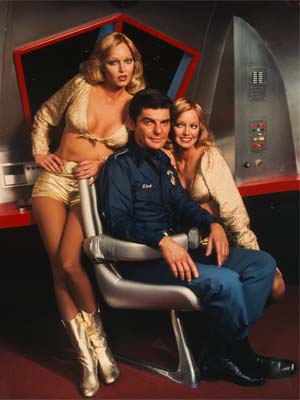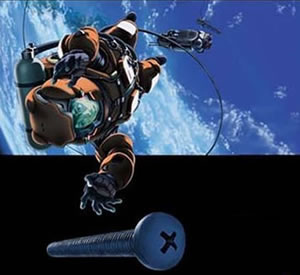Science Fiction
Dictionary
A B C D E F G H I J K L M N O P Q R S T U V W X Y Z
Space Debris Cleanup Suggestions Ignored

Space debris cleanup suggestions by fiction writers have been made repeatedly; all have been ignored by the world's space agencies. Now, we have a real problem.
This past week, ISS astronauts have ducked into a Russian space capsule for protection from space debris:
This follows the incident last month in which a Russian cosmos 2251 satellite improbably collided with an Iridium 33 satellite, creating enormous debris clouds:
"This is the first time we've ever had two intact spacecraft accidentally run into each other," said Nicholas Johnson, chief scientist of NASA's Orbital Debris Program Office at the Johnson Space Center in Houston. "It was a bad day for both of them."
The three astronauts, two Americans and one Russian, moved into the station's attached Soyuz TMA-13 spacecraft at 12:35 p.m. EDT (1635 GMT) as a safety precaution in case the debris - a small piece of a spent satellite motor - slammed into the orbiting lab and ripped a hole in its outer hull. The astronauts were ready to evacuate the space station if the debris hit the station and depressurized its living space.
According to an e-mail alert issued by NASA today, Russia's Cosmos 2251 satellite slammed into the Iridium craft at 11:55 a.m. EST (0455 GMT) over Siberia at an altitude of 490 miles (790 km). The incident was observed by the U.S. Defense Department's Space Surveillance Network, which later was tracking two large clouds of debris.
(Animation of satellite collision debris clouds)
Satellite debris has been a problem for many years. Of course, you'd think NASA and all the other space agencies would be ready with a solution.
Wrong.
Science fiction writers of all sorts, on the other hand, have been sounding the warning for generations, and weaving the solutions into popular culture.
For example, take a look at the 1977 television series Quark. This comedy, created by legendary writer Buck Henry, described the activities of the United Galaxies Sanitation Patrol Cruiser, an interstellar garbage scow.

(Richard Benjamin and the Barnstable twins)
Richard Benjamin played Adam Quark, who worked to clean up trash in space. He is ably assisted by the Bettys, played by the Doublemint twins (Cyb and Patricia Barnstable).
In his 1978 novel The Fountains of Paradise, Arthur C. Clarke uses Operation Cleanup to make sure that low earth orbit is clear of debris for the newly constructed space elevator.
Fortunately, the old orbital forts were superbly equipped for this task. Their radars - designed to locate oncoming missles at extreme ranges with no advance warning - could easily pinpoint the debris of the early Space Age. Then their lasers vaporized the smaller satellites, while the larger ones were nudged into higher and harmless orbits.
Fans may also recall Planetes, an anime series published by Makoto Yakimura in Japan starting in 1999. The series follows a team of debris cleaners who clear space junk from flight paths.

Planetes cover art
Sources: Station Astronauts Take Shelter from Space Debris and U.S. Satellite Destroyed in Space Collision; thanks to Moira for the tip and a reference.
Scroll down for more stories in the same category. (Story submitted 3/19/2009)
Follow this kind of news @Technovelgy.| Email | RSS | Blog It | Stumble | del.icio.us | Digg | Reddit |
Would
you like to contribute a story tip?
It's easy:
Get the URL of the story, and the related sf author, and add
it here.
Comment/Join discussion ( 3 )
Related News Stories - (" Space Tech ")
The New Habitable Zones Include Asimov's Ribbon Worlds
'...there's a narrow belt where the climate is moderate.' - Harl Vincent, 1931.
Will Space Stations Have Large Interior Spaces Again?
'They filed clumsily into the battleroom, like children in a swimming pool for the first time, clinging to the handholds along the side.' - Orson Scott Card, 1985.
Reflect Orbital Offers 'Sunlight on Demand' And Light Pollution
'I don't have to tell you about the seven two-mile-diameter orbital mirrors...'
Chrysalis Generation Ship to Alpha Centauri
'This was their world, their planet ó
this swift-traveling, yet seemingly moveless vessel.' - Nat Schachner, 1934
Technovelgy (that's tech-novel-gee!) is devoted to the creative science inventions and ideas of sf authors. Look for the Invention Category that interests you, the Glossary, the Invention Timeline, or see what's New.
Science Fiction
Timeline
1600-1899
1900-1939
1940's 1950's
1960's 1970's
1980's 1990's
2000's 2010's
Current News
The New Habitable Zones Include Asimov's Ribbon Worlds
'...there's a narrow belt where the climate is moderate.'
Can One Robot Do Many Tasks?
'... with the Master-operator all you have to do is push one! A remarkable achievement!'
Atlas Robot Makes Uncomfortable Movements
'Not like me. A T-1000, advanced prototype. A mimetic poly-alloy. Liquid metal.'
Boring Company Drills Asimov's Single Vehicle Tunnels
'It was riddled with holes that were the mouths of tunnels.'
Humanoid Robots Tickle The Ivories
'The massive feet working the pedals, arms and hands flashing and glinting...'
A Remarkable Coincidence
'There is a philosophical problem of some difficulty here...'
Cortex 1 - Today A Warehouse, Tomorrow A Calculator Planet
'There were cubic miles of it, and it glistened like a silvery Christmas tree...'
Perching Ambush Drones
'On the chest of drawers something was perched.'
Leader-Follower Autonomous Vehicle Technology
'Jason had been guiding the caravan of cars as usual...'
Golf Ball Test Robot Wears Them Out
"The robot solemnly hit a ball against the wall, picked it up and teed it, hit it again, over and again...'
Boring Company Vegas Loop Like Asimov Said
'There was a wall ahead... It was riddled with holes that were the mouths of tunnels.'
Rigid Metallic Clothing From Science Fiction To You
'...support the interior human structure against Jupiterís pull.'
Is The Seattle Ultrasonics C-200 A Heinlein Vibroblade?
'It ain't a vibroblade. It's steel. Messy.'
Roborock Saros Z70 Is A Robot Vacuum With An Arm
'Anything larger than a BB shot it picked up and placed in a tray...'
A Beautiful Visualization Of Compact Food
'The German chemists have discovered how to supply the needed elements in compact, undiluted form...'
Bone-Building Drug Evenity Approved
'Compounds devised by the biochemists for the rapid building of bone...'
